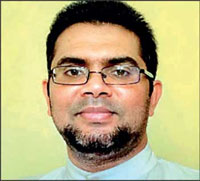Saturday Feb 21, 2026
Saturday Feb 21, 2026
Saturday, 11 December 2021 00:00 - - {{hitsCtrl.values.hits}}
 By Fr. Rashmi Madusanka Fernando
By Fr. Rashmi Madusanka Fernando
It brings always joy to recall my first-ever pastoral experience in Hingurakgoda Church in the very first year of my priesthood.
Upasaka Thaththa in Mission House
It was 16 September 2017, the first day of my arrival at Christ the King Church, Hingurakgoda. The first sight I had ever had of the place elated my spirit in that pleasant morning. An elderly person dressed in a white sarong with absolutely nothing to cover his torso was sweeping the compound just the way I have seen it is being done by the samaneras (novices) and monks in the temple with quiet a composure and serenity.
“I was told about your coming, Father. Have you eaten?” was the first-ever welcoming words I heard of anybody of that place and I am happy that they came from that Upasaka Thaththa (worshipful elder) who had some drops of sweat on his chest while speaking to me. ‘Could there be any better way to welcome a stranger than inquiring whether or not he or she has eaten?’ I wondered.
This matured being whom I soon learned was the cook of the Lagum Ge (Mission House) was an unmarried elder in his late 60s who had once been a Buddhist monk in his youth. It was a different joy altogether to share the space with him in the same Lagum Ge.
He was more than a cook to me. There was hardly anybody in the whole of 550 odd families in that church who had not drunk a cup of tea or eaten a piece of biscuit that this person has offered, often against the rule of the Fathers, because the observation of one hour of fasting before the Holy Mass is encouraged for all Catholics as a preparation for receiving the most precious body and blood of Christ during the celebration of the Holy Eucharist.
His justification in doing so, more sneakily than overtly, was as simple and humane as ever: “Where on earth do people go to temples and churches having had their full? They all come not only to fill their souls but also their bellies. Don’t they, Father?” I was dumbfounded at his human-centeredness and I had nothing more to say than to nod affirmatively, “Why not, Thaththta!”
It has often been noted that he was the first person, even before the priest, to visit whosoever he heard of been hospitalised in the village for one reason or another, be it a pregnant mother, or a sick child, or an ailing elder, etc. regardless of his or her faith. All of these visits he made were never empty-handed. He made sure to fetch something or the other from the mission house to take to that sufferer, be it a towel, a packet of milk or biscuits, etc.
This devoted elder died on the way to Ederamulla during the Christmas octave in 2017 as he was going to see some children of a Christian household where he had worked earlier. There too he was found carrying a box of Christmas edibles collected from the mission house to be given to that family.
The scene created at his burial in Kegalle, the far interior of a rubber estate, should be recounted. There was an extra enthusiasm of the Hingurakgoda parishioners to participate in this virtuous being’s last rights. Upon arrival at the place, almost at the time for pansekule (final rights according to the Buddhist rituals), we found this Upasaka Thaththa, dressed in a white sarong and a white shirt, lying in a very ordinary coffin with hardly anybody to cry over his death.
It was however difficult for the Hingurakgoda Catholic parishioners to hide their tears. The priests were the first ones to burst into tears no sooner than they saw their feeder. Then, the congregation joined, and I saw those children and their parents too (confirmation of which I had much later) were weeping heavily.
As we were about to depart, the key organiser of the funeral household approached me and asked: “Sir, nobody cried from our side over his death, but from the time you all came, you have been crying unceasingly. What has he done so much that all you feel for him so much?”
It wasn’t the time for a lengthy explanation of what this noble person has been and done to us. Nevertheless, he should be witnessed. Thus, recalling chapter 25 of St. Matthew’s Gospel, I said: “We were hungry, and he gave us to eat. We were thirsty, he gave us to drink. We were sick and hospitalised, and he came to see us.”
(The second part of this article will be carried in the next edition of the Harmony page).
(Fr. Rashmi Madusanka Fernando, SJ is a Jesuit Priest in the Society of Jesus, Sri Lanka, and the present Director of Satyodaya Centre for Social Research and Encounter, 30, Pushpadana Mawatha, Kandy 20000, Sri Lanka. He can be reached via [email protected].)